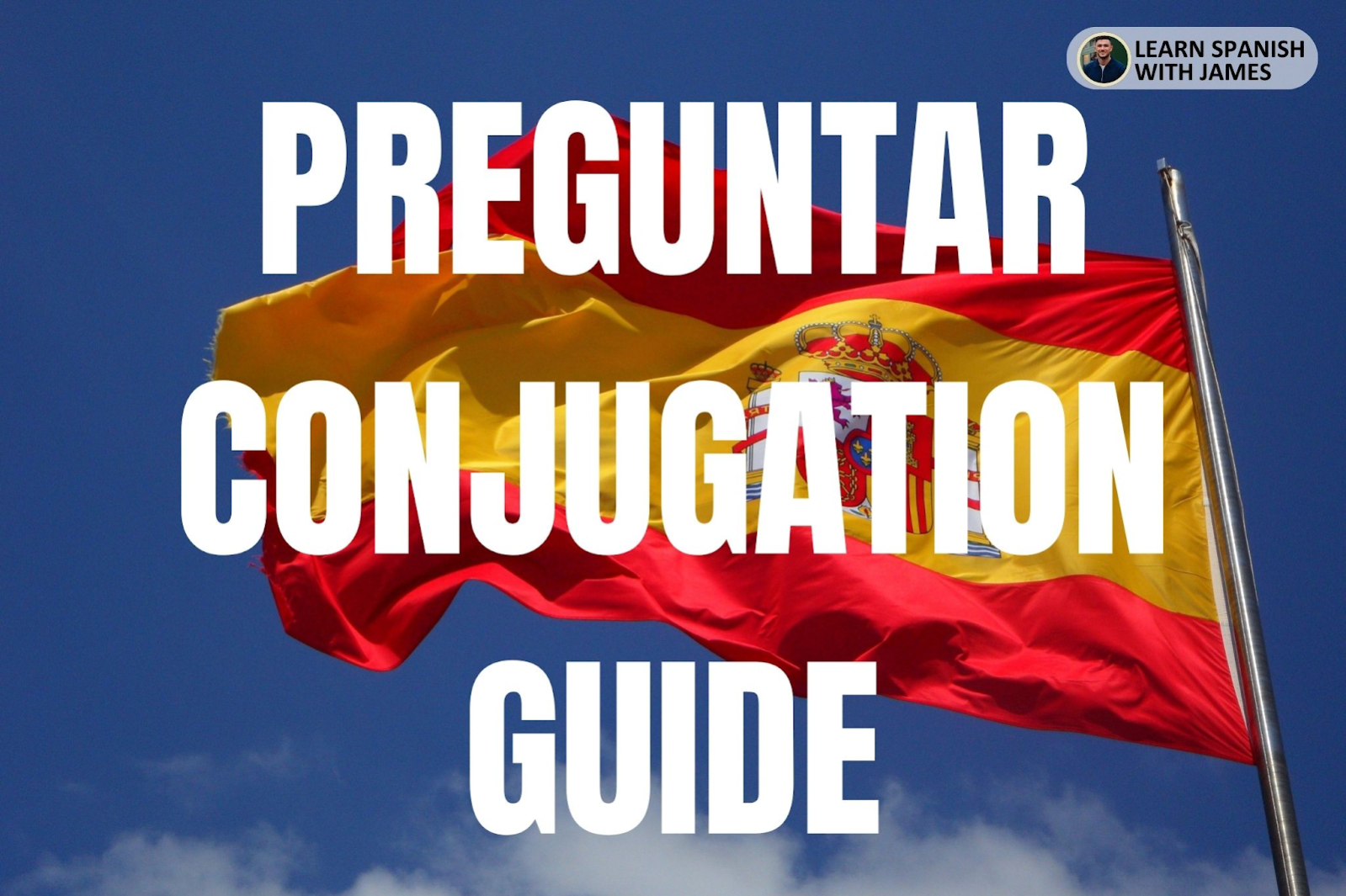Preguntar Conjugation Chart & Full Tense Guide

The verb “preguntar” in Spanish translates to “to ask,” and it’s a great verb to know in everyday communication.
Whether you’re seeking information, clarifying doubts, or engaging in conversation, knowing how to conjugate “preguntar” is very useful.
“Preguntar” is a regular -AR verb and you can use it in various contexts. So, it will help you learn Spanish verb conjugation patterns for regular -AR verbs.
I’m James, from Learn Spanish With James and the host of the Learn Spanish With James Podcast.
Below, you’ll find conjugation charts for this regular verb across different tenses. From the indicative to the subjunctive and imperative moods, I’ll show you all you need to know.
By the end of this guide, you’ll have a firm understanding of how to conjugate Spanish verbs like “preguntar” in Spanish and apply it confidently in everyday conversations.
Present Tense
Pronouns Pronombres Conjugation
I yo pregunto
you tú preguntas
he,she,it, you(formal) él,ella,usted pregunta
we nosotros,nosotras preguntamos
you pl. vosotros, vosotras preguntáis
they, you pl. (formal) ellos,ellas,ustedes preguntan
When We Use the Present Tense
The present tense in Spanish indicates actions happening now or habitual actions.
For a regular verb like “preguntar,” remove the -ar ending and add the appropriate ending for each subject pronoun.
Examples of the Spanish Verb Preguntar in the Present Tense
- Yo pregunto la dirección. (I ask for directions.)
- Tú preguntas mucho. (You ask a lot.)
- Él/Ella pregunta sobre el tema. (He/She asks about the topic.)
- Nosotros preguntamos al profesor. (We ask the teacher.)
- Vosotros preguntáis a vuestros padres. (You [all] ask your parents.)
- Ellos/Ellas preguntan la hora. (They ask for the time.)
Preterite Tense
Pronouns Pronombres Conjugation
I yo pregunté
you tú preguntaste
he, she. it, you (formal) él, ella, usted preguntó
we nosotros, nosotras preguntamos
you (plural) vosotros, vosotras preguntasteis
they, you (pl. formal) ellos, ellas, ustedes preguntaron
When We Use the Preterite Tense
The preterite tense in Spanish is used to describe completed actions in the past. For example, “I asked you a question” (as opposed to “I was asking” or “I have asked”).
Regular AR verbs like “preguntar” in Spanish follow a set verb conjugation pattern in the preterite tense.
Examples of Preguntar in the Preterite Tense
- Yo pregunté en la tienda. (I asked in the store.)
- Tú preguntaste por ella. (You asked about her.)
- Él/Ella preguntó en la clase. (He/She asked in class.)
- Nosotros preguntamos en la conferencia. (We asked at the conference.)
- Vosotros preguntasteis al guía. (You [all] asked the guide.)
- Ellos/Ellas preguntaron en la calle. (They asked on the street.)
Imperfect Tense
Pronouns Pronombres Conjugation
I yo preguntaba
you tú preguntabas
he, she, it, you (formal) él, ella, usted preguntaba
we nosotros, nosotras preguntábamos
you (plural) vosotros, vosotras preguntabais
they, you(pl. formal) ellos, ellas, ustedes preguntaban
When We Use the Imperfect Tense
Next, we have the imperfect tense. In Spanish, we use this tense to describe ongoing or habitual actions in the past.
An example is “I was asking” or “I used to ask”.
For regular AR verbs like “preguntar,” conjugation follows a specific pattern.
Examples of Preguntar in the Imperfect Tense
- Yo preguntaba cada día. (I used to ask every day.)
- Tú preguntabas por qué. (You used to ask why.)
- Él/Ella preguntaba en clase. (He/She used to ask in class.)
- Nosotros preguntábamos al maestro. (We used to ask the teacher.)
- Vosotros preguntabais a menudo. (You [all] used to ask often.)
- Ellos/Ellas preguntaban todo. (They used to ask everything.)
Future Tense
Pronouns Pronombres Conjugation
I yo preguntaré
you tú preguntarás
he,she,it, you(formal) él,ella,usted preguntará
we nosotros,nosotras preguntaremos
you pl. vosotros, vosotras preguntaréis
they, you pl. (formal) ellos,ellas,ustedes preguntarán
When We Use the Future Tense
Next, we have the future tense. In Spanish it is used to express actions that will happen in the future.
For example, “I will ask him tomorrow”.
As established, regular AR verbs like “preguntar” follow a predictable conjugation pattern, which you can see in the “preguntar” conjugation chart above, and in the example sentences below.
Examples of Preguntar in the Future Tense
- Yo preguntaré más tarde. (I will ask later.)
- Tú preguntarás a la profesora. (You will ask the teacher.)
- Él/Ella preguntará sobre el proyecto. (He/She will ask about the project.)
- Nosotros preguntaremos en la reunión. (We will ask in the meeting.)
- Vosotros preguntaréis en la clase. (You [all] will ask in the class.)
- Ellos/Ellas preguntarán en la oficina. (They will ask in the office.)
Conditional Tense
Pronouns Pronombres Conjugation
I yo preguntaría
you tú preguntarías
he,she,it, you(formal) él,ella,usted preguntaría
we nosotros,nosotras preguntaríamos
you pl. vosotros, vosotras preguntaríais
they, you pl. (formal) ellos,ellas,ustedes preguntarían
When We Use the Conditional Tense
The conditional tense in Spanish is used to express actions that would happen under certain conditions.
This is one of the easiest tenses to learn. Just like the future tense, you do not need to change the stem. Instead, just add the relevant endings.
Examples of Preguntar in the Conditional Tense
- Yo preguntaría si estuviera aquí. (I would ask if he/she were here.)
Note: “Estuviera” is an example of an “estar” conjugation in the imperfect subjunctive form. - Tú preguntarías más detalles. (You would ask for more details.)
- Él/Ella preguntaría sobre el precio. (He/She would ask about the price.)
- Nosotros preguntaríamos en la conferencia. (We would ask at the conference.)
- Vosotros preguntaríais por la dirección. (You [plural] would ask for directions.)
- Ellos/Ellas preguntarían a qué hora. (They would ask what time.)
Perfect Tense
Pronouns Pronombres Auxiliary verb ‘haber’ Past Participle
I yo he preguntado
you tú has preguntado
he,she,it, you(formal) él,ella,usted ha preguntado
we nosotros,nosotras hemos preguntado
you pl. vosotros, vosotras habéis preguntado
they, you pl. (formal) ellos,ellas,ustedes han preguntado
When We Use the Perfect Tense
The perfect tense in Spanish, also known as the “preterite perfect”, is used to describe actions that “have” been, using the auxiliary verb “haber” – “to have”.
For example, “I have asked”.
This is then followed by the past participle – “preguntado”.
Examples of Preguntar in the Preterite Perfect Tense
- Yo he preguntado la pregunta sobre la tarea. (I have asked about the homework.)
- Tú has preguntado en la biblioteca. (You have asked in the library.)
- Él/Ella ha preguntado a sus amigos. (He/She has asked his/her friends.)
- Nosotros hemos preguntado al profesor. (We have asked the teacher.)
- Vosotros habéis preguntado la dirección. (You [all] have asked for directions.)
- Ellos/Ellas han preguntado por ti. (They have asked about you.)
Pluperfect Tense
Pronouns Pronombres Auxiliary verb ‘haber’ Past Participle
I yo había preguntado
you tú habías preguntado
he,she,it, you(formal) él,ella,usted había preguntado
we nosotros,nosotras habíamos preguntado
you pl. vosotros, vosotras habíais preguntado
they, you pl. (formal) ellos,ellas,ustedes habían preguntado
When We Use the Pluperfect Tense
Next up, we have the pluperfect tense.
In Spanish we use this tense to describe actions that had already occurred before another past action.
Again, for this tense the auxiliary verb “haber” is needed, followed by the past participle “preguntado”.
Examples of Preguntar in the Pluperfect Tense
- Yo había preguntado antes. (I had asked before.)
- Tú habías preguntado la dirección. (You had asked for directions.)
- Él/Ella había preguntado en la oficina. (He/She had asked in the office.)
- Nosotros habíamos preguntado sobre el proyecto. (We had asked about the project.)
- Vosotros habíais preguntado a qué hora. (You [all] had asked what time.)
- Ellos/Ellas habían preguntado por ti. (They had asked about you.)
Future Perfect Tense
Pronouns Pronombres Auxiliary verb ‘haber’ Past Participle
I yo habré preguntado
you tú habrás preguntado
he,she,it, you(formal) él,ella,usted habrá preguntado
we nosotros,nosotras habremos preguntado
you pl. vosotros, vosotras habréis preguntado
they, you pl. (formal) ellos,ellas,ustedes habrán preguntado
When We Use the Future Perfect Tense
The future perfect tense in Spanish describes actions that will have been completed by a certain point in the future.
We need to conjugate “haber” in the future perfect tense – “will have” – then use the past participle.
Examples of Preguntar in the Future Perfect Tense
- Yo habré preguntado antes de la reunión. (I will have asked before the meeting.)
- Tú habrás preguntado sobre el tema. (You will have asked about the topic.)
- Él/Ella habrá preguntado por ti. (He/She will have asked about you.)
- Nosotros habremos preguntado al director. (We will have asked the director.)
- Vosotros habréis preguntado en la clase. (You [all] will have asked in the class.)
- Ellos/Ellas habrán preguntado a qué hora empieza. (They will have asked what time it starts.)
Conditional Perfect Tense
Pronouns Pronombres Auxiliary verb ‘haber’ Past Participle
I yo habría preguntado
you tú habrías preguntado
he,she,it, you(formal) él,ella,usted habría preguntado
we nosotros,nosotras habríamos preguntado
you pl. vosotros, vosotras habríais preguntado
they, you pl. (formal) ellos,ellas,ustedes habrían preguntado
When We Use the Conditional Perfect Tense
The conditional perfect tense in Spanish is used to describe actions that would have been completed under certain conditions.
In order to use the conditional perfect tense, we need to conjugate “haber” in the – “would have” – then use the past participle.
Examples of Preguntar in the Conditional Perfect Tense
- Yo habría preguntado si hubiera sabido. (I would have asked if I had known.)
- Tú habrías preguntado más detalles. (You would have asked for more details.)
- Él/Ella habría preguntado en la clase. (He/She would have asked in class.)
- Nosotros habríamos preguntado al profesor. (We would have asked the teacher.)
- Vosotros habríais preguntado en la biblioteca. (You [all] would have asked in the library.)
- Ellos/Ellas habrían preguntado sobre el proyecto. (They would have asked about the project.)
Present Subjunctive
Pronouns Pronombres Conjugation
I yo pregunte
you tú preguntes
he,she,it, you(formal) él,ella,usted pregunte
we nosotros,nosotras preguntemos
you pl. vosotros, vosotras preguntéis
they, you pl. (formal) ellos,ellas,ustedes pregunten
When We Use the Present Subjunctive
The present subjunctive in Spanish is used to express desires, doubts, or hypothetical situations.
It’s a little complex to go into here, but you can see all present subjunctive endings for -AR verbs below.
Examples of Preguntar in the Present Subjunctive
- Yo quiero que tú preguntes. (I want you to ask.)
- Es importante que preguntes ahora. (It’s important that you ask now.)
- Ojalá que él pregunte sobre el tema. (Hopefully he asks about the topic.)
- Espero que nosotros preguntemos pronto. (I hope we ask soon.)
- Recomiendo que vosotros preguntéis en la clase. (I recommend that you [all] ask in class.)
- Dudo que ellos pregunten correctamente. (I doubt they ask correctly.)
Imperfect Subjunctive
Pronouns Pronombres Conjugation
I yo preguntara, preguntase
you tú preguntaras, preguntases
he,she,it, you(formal) él,ella,usted preguntara, preguntase
we nosotros,nosotras preguntáramos, preguntásemos
you pl. vosotros, vosotras preguntarais, preguntaseis
they, you pl. (formal) ellos,ellas,ustedes preguntaran, preguntasen
When We Use the Imperfect Subjunctive
The imperfect subjunctive in Spanish is used to express hypothetical or uncertain situations in the past. Regular AR verbs like “preguntar” follow a set conjugation pattern. Only the first person plural has an accent here.
Examples of Preguntar in the Imperfect Subjunctive
- Yo quería que tú preguntaras. (I wanted you to ask.)
- Era necesario que preguntaras al profesor. (It was necessary for you to ask the teacher.)
- Prefería que él preguntara antes. (I preferred that he asked earlier.)
- Dudábamos que nosotros preguntáramos lo correcto. (We doubted that we asked the right thing.)
- Recomendaba que vosotros preguntarais en la biblioteca. (I recommended that you [all] ask in the library.)
- Esperábamos que ellos preguntaran más tarde. (We hoped they would ask later.)
Affirmative Imperative
Pronouns Pronombres Conjugation
you tú ¡pregunta!
he,she,it, you(formal) él,ella,usted ¡pregunte!
we nosotros,nosotras ¡preguntemos!
you pl. vosotros, vosotras ¡preguntad!
they, you pl. (formal) ellos,ellas,ustedes ¡pregunten!
When We Use The Affirmative Imperative
The affirmative imperative mood in Spanish is used to give direct commands or requests.
When using the affirmative imperative with the verb “preguntar”, you are instructing someone to ask something.
This can be in the form of a suggestion or a direct command, depending on the context.
Examples of How to Conjugate “Preguntar” in the Affirmative Imperative
- Tú: Pregunta sobre el tema.
(Ask about the topic.) - Usted: Pregunte al profesor.
(Ask the teacher.) - Nosotros: Preguntemos en la clase.
(Let’s ask in class.) - Vosotros: Preguntad a vuestros amigos.
(Ask your friends.) - Ustedes/Ellos/Ellas: Pregunten en la biblioteca.
(Ask in the library.)
Negative Imperative
Pronouns Pronombres Conjugation
you tú ¡no preguntes!
he,she,it, you(formal) él,ella,usted ¡no pregunte!
we nosotros,nosotras ¡no preguntemos!
you pl. vosotros, vosotras ¡no preguntéis!
they, you pl. (formal) ellos,ellas,ustedes ¡no pregunten!
When We Use The Negative Imperative
The negative imperative mood in Spanish is used to give commands that tell someone not to do something.
When using the negative imperative with the verb “preguntar” (to ask), you are instructing someone not to ask something.
Add a “no” before the verb and switch the conjugation to the subjunctive form. I have written some examples below.
Examples of How to Conjugate “Preguntar” in the Negative Imperative
- Tú: No preguntes tanto.
(Don’t ask so much.) - Usted: No pregunte aquí.
(Don’t ask here.) - Nosotros: No preguntemos ahora.
(Let’s not ask now.) - Vosotros: No preguntéis por ella.
(Don’t ask about her.) - Ustedes/Ellos/Ellas: No pregunten a qué hora.
(Don’t ask what time.)
Online Spanish Courses & Grammar Courses
For a full list of Beginner, Intermediate and Advanced Courses, check out this full list of online Spanish courses.
I put this list together myself, and it comprises a mixture of courses that offer Spanish grammar practice for all levels, conversational practice, Spanish verb conjugation, listening and writing exercises in Spanish, free Spanish courses, and a whole lot more.
The fastest way to learn Spanish is to test a mixture of Spanish resources and choose the course that coincides most with your learning style.
In addition to online Spanish courses, on this site you will find a wide range of Spanish podcasts, Spanish apps, Spanish YouTube channels, and both online and physical Spanish language schools.

About James – Or Should that be Santiago?
My name is James. I am a Brit with a love for the Spanish language. I have lived in Spain, Argentina, and Costa Rica, and I have been teaching Spanish for over a decade. This site will show you how to master the elements of Spanish grammar that often dishearten learners. I hope you enjoy the site and find it useful.
If you are interested in taking your Spanish to the next level, check out the Courses section for a full list of the Spanish courses I suggest. All reviews are based on my personal opinions.







